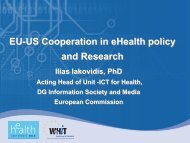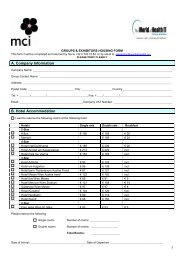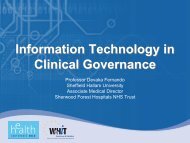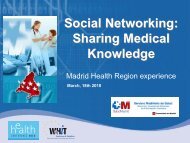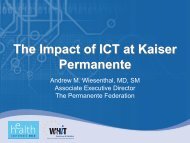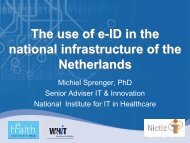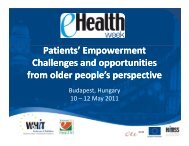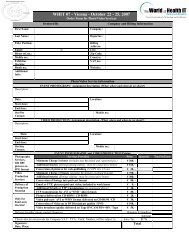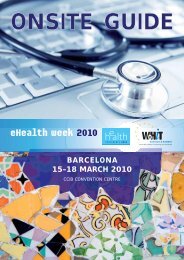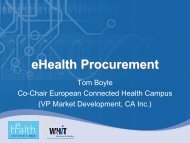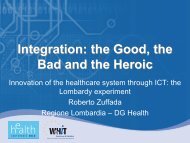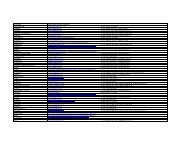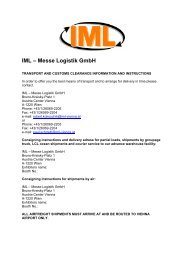eHealth Week 2012 ONSITE GUIDE - World of Health IT
eHealth Week 2012 ONSITE GUIDE - World of Health IT
eHealth Week 2012 ONSITE GUIDE - World of Health IT
You also want an ePaper? Increase the reach of your titles
YUMPU automatically turns print PDFs into web optimized ePapers that Google loves.
e H e a l t h W e e k 2 0 1 2 O N S I T E G U I D E<br />
Conference Sessions<br />
Wednesday, 9 May l Closing Plenary Session<br />
14:45–16:00<br />
14:45–16:00 Hall C5<br />
PL5 | Challenges in the European <strong>Health</strong>care Sector and a Technological Perspective on<br />
a Remedy?<br />
Mr. Ole Kjær, Director <strong>of</strong> Organisational Development – Ministry <strong>of</strong> Taxation<br />
Dr. Josep Figueras, Director <strong>of</strong> the European Observatory on <strong>Health</strong> Systems and Policies, WHO European Centre<br />
for <strong>Health</strong> Policy<br />
KEYNOTE<br />
Demographics as well as economic challenges face healthcare now and with increasing intensity in the coming years. A change <strong>of</strong><br />
mind-set is required to face these challenges. Dr. Josep Figueras, the Director <strong>of</strong> the European Observatory on <strong>Health</strong> Systems<br />
and Policies, WHO European Centre for <strong>Health</strong> Policy will give a speech on the challenges that we face currently and in future.<br />
Better adapted healthcare services and a preventive approach to chronic diseases could reduce public spending on health and<br />
dependency care by half.<br />
One <strong>of</strong> the means to increase productivity in healthcare to meet some <strong>of</strong> the challenges that we face is <strong>e<strong>Health</strong></strong>. <strong>e<strong>Health</strong></strong> can:<br />
• Increase flexibility and promote new ways <strong>of</strong> organizing treatment leading to increased output and improved quality in care for<br />
patients<br />
• Enable a more individual based treatment by mobilizing and thereby empower and involve patients in their own treatment<br />
• Improve working conditions for the employees in the health and welfare sectors<br />
Most European healthcare systems will undergo a transformation in the coming years not least due to the above-mentioned factors<br />
and will be forced to use resources even more efficiently. One <strong>of</strong> the most immediate resources that are poorly utilized today is the<br />
patient’s own. <strong>e<strong>Health</strong></strong> can contribute to that end. On the basis <strong>of</strong> a sector that has come a long way in mobilizing the citizen it is<br />
illustrated how ICT can play a significant role.<br />
The plenary session will look into possible ways that digitisation has supported the tax system in providing a more efficient and<br />
service minded approach to the citizen. The Danish Tax system has been subject to a radical change in the management <strong>of</strong> the<br />
citizen’s tax matters. In 1987 it was paper based. In 2008 80 % was paperless and only a few percent involved paper. What are<br />
the lessons learned and the efficiency gained from another public sector in regard to the radical way <strong>of</strong> communicating with the<br />
Danish tax payers and manage the citizen’s tax matters?<br />
www.ehealthweek.org<br />
38<br />
LINKING PEOPLE, POTENTIAL AND PROGRESS



